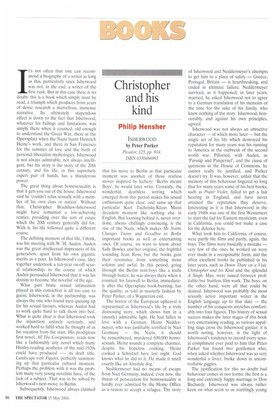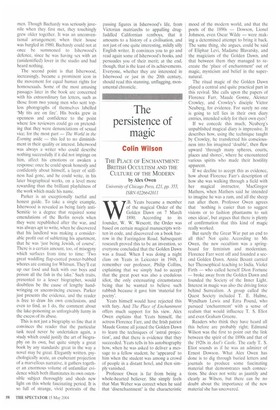Christopher and his kind
Philip Hensher
ISHERWOOD by Peter Parker Picador, £25, pp. 914, ISBN 0330486993 Jt's not often that one can recommend a biography of a writer as long as this, particularly since Isherwood was not, in the end, a writer of the first rank. But in this case there is no doubt: this is a book which simply must be read, a triumph which produces from years of dense research a marvellous, immense narrative. Its ultimately stupendous effect is down to the fact that Isherwood, whatever his failings and limitations, was simply there when it counted: old enough to understand the Great War, there at the Opernplatz when the Nazis burnt Heinrich Heine's work, and there in San Francisco for the summer of love and the birth of personal liberation mythologies. Isherwood is not always admirable, not always intelligent, but his story is the story of the 20th century, and his life, in this supremely expert pair of hands, has a thunderous power.
The great thing about homosexuality is that it gets you out of the house. Isherwood said he 'couldn't relax sexually with a member of his own class or nation'. Without that. Christopher Bradshaw-Isherwood might have remained a low-achieving rentier, presiding over the sort of estate which the 20th century generally did for. With it, his life followed quite a different course.
The defining moment of that life, I think, was his meeting with W. H. Auden. Auden was the great intellectual impresario of his generation, apart from his own gigantic merits as a poet. In Isherwood's case, they together undertook a ten-year on-off sexual relationship, in the course of which Auden persuaded Isherwood that it was his destiny to become 'the novelist' of the age.
What part brute sexual infatuation played in this conviction is all too easy to guess; Isherwood, in the partnership, was always the one who found men queuing up for his sexual favours, whereas Auden had to work quite hard to talk them into bed. What is quite clear is that Isherwood took the injunction entirely seriously, and worked hard to fulfil what he thought of as his vocation from the start. His prodigious first novel, All The Conspirators, reads now like a fashionably arty novel which many Huxley-reading aesthetes of the mid-1920s could have produced — its draft title, Landscape with Figures, perfectly summoning up that particular cultural moment. Perhaps the problem with it was the problem many very young novelists have, of the lack of a subject. That was to be solved by Isherwood's next move, to Berlin.
Subsequently, Isherwood always claimed
that his move to Berlin at that particular moment was another of those restless moves inspired by lechery: 'Berlin meant Boys', he would later write. Certainly, the wonderful, deathless writing which emerged from this period makes his sexual enthusiasm quite clear, and sums up that particular Kurt Tucholsky/Klaus Mann decadent moment like nothing else in English. But looming behind it, never overdone, always chillingly convincing, is the rise of the Nazis, which makes Mr Norris Changes Trains and Goodbye to Berlin important books as well as entertaining ones. Of course, we want to know about Sally Bowles and her original, the frightful sounding Jean Ross; but the books gain their resonance from something more solemn and awful. In this period, going through the Berlin rent-boys like a knife through butter, he was always there when it counted; his farewell to Berlin, immediately after the Opernplatz book-burning, has the quality, as told in masterly fashion by Peter Parker, of a Wagnerian exit.
The horror of the European upheaval is represented in Isherwood's life by a truly distressing story, which shows him in a (mostly) admirable light. He had fallen in love with a German, Heinz Neddermeyer, who was justifiably terrified in Nazi Germany — the Nazis, it should be remembered, murdered 600,000 homosexuals. Heinz sounds a complete charmer, despite his hopeless cooking. 'Heinz cooked a Schnitzel here last night. God knows what he did to it. He made it smell exactly like an Airedale dog.'
Neddermeyer had no means of escape from Nazi Germany; indeed, even now, the threat of persecution for homosexuality is hardly ever admitted by the Home Office as a reason to accept a refugee. The story of Isherwood and Neddermeyer's attempts to get him to a place of safety — Greece, Portugal. Britain — is heartbreaking, and ended in ultimate failure. Neddermeyer survived, as it happened; in later years, married, he asked Isherwood not to agree to a German translation of his memoirs of the time for the sake of his family, who knew nothing of the story. Isherwood, honourably, and against his own principles, agreed.
Isherwood was not always an attractive character — of which more later — but the single act of his life which destroyed his reputation for many years was his running to America at the outbreak of the second world war. Pilloried, with Auden, as 'Parsnip and Pimpernel', and the cause of questions in the House of Commons, he cannot really be justified, and Parker doesn't try. It was, however, unfair that the memory of this behaviour lingered so long that for many years some of his best books, such as Prater Violet, failed to get a fair hearing in England, and have never attained the reputation they deserve. Interesting as it is that Isherwood in the early 1940s was one of the first Westerners to start the fad for Eastern mysticism, even in California, you could not make a case for the defence here.
What took him to California, of course, were partly the films and partly, again, the boys. The films were basically a mistake — very few of the ones he worked on were ever made in a recognisable form, and the often excellent books he published in his later years, such as Down There on a Visit, Christopher and his Kind and the splendid A Single Man, were issued between profitable but fruitless film work. The boys, on the other hand, were all that could be desired. Isherwood was probably the most sexually active important writer in the English language up to that date — the number of his conquests stretches comfortably into four figures. This history of sexual success makes the later stages of this book very entertaining reading, as various appalling slags cross the Isherwood gaydar; it is worth noting, however, in the light of Isherwood's tendency to record every sexual compliment ever paid to him that Peter Parker has found two gentlemen who, when asked whether Isherwood was so very wonderful a lover, broke down in uncontrollable giggles.
The justification for this no doubt bad behaviour comes in two forms: the first is a long and extremely happy marriage to Don Bachardy. Isherwood was always rather keen on what seem to us startlingly young men. Though Bachardy was seriously juvenile when they first met, they touchingly grew older together. It was an unconventional arrangement; when their house was burgled in 1980, Bachardy could not at once be summoned to Isherwood's defence, since he was having sex with an (unidentified) lover in the studio and had heard nothing.
The second point is that Isherwood, increasingly, became a prominent icon in the movement for equal human rights for homosexuals. Some of the most amusing passages later in the book are concerned with his extraordinary fan letters, such as those from two young men who sent topless photographs of themselves labelled 'My tits are on fire'. His books grew in openness and confidence to the point where few reviewers could go on pretending that they were denunciations of sexual vice; for the most part — The World in the Evening aside — this led to no diminishment in their quality or interest. Isherwood was always a writer who could describe nothing successfully if it did not impinge on him, affect his emotions or awaken a response; once he could speak honestly and confidently about himself, a layer of stiffness had gone, and he could write, in his later biographical works, on a level more rewarding than the brilliant playfulness of the work which made his name.
Parker is an exceptionally tactful and honest guide. To take a single example. Isherwood is revealed as being fairly antiSemitic to a degree that required some emendations of the Berlin novels when they were republished after the war, and was always apt to write, when he discovered that his landlord was making a considerable profit out of subletting his apartment, that he was 'just being Jewish, of course'. There is a certain amount, too, of misogyny which surfaces from time to time: 'Two great waddling flap-cunted pouter-bubbed whores are coming for Whitsun. They'll eat up our food and fuck with our boys and poison all the fish in the lake.' Such traits, presented to a lesser biographer, would doubtless be the cause of lengthy handwringing or unconvincing excuses. Parker just presents the evidence, and the reader is free to draw his own conclusions, and even to find, as I do, the comment about the lake-poisoning as unforgivably funny in the excess of its abuse.
This is not just a biography so fine that it convinces the reader that the particular task need never be undertaken again, a study which could justify the art of biography on its own, but quite simply a great book by any standards: great in the way a novel may be great. Elegantly written, psychologically acute, an exuberant projection of a marvellous narrative, it gathers together an enormous volume of unfamiliar evidence which both illuminates its own ostensible subject thoroughly and sheds new light on this whole fascinating period. It is so full of strange, vivid portraits of the passing figures in Isherwood's life, from Victorian matriarchs to appalling drugfuddled Californian rentboys, that it amounts to a history of a civilisation, and not just of one quite interesting, mildly silly English writer. It convinces you to go and read again some of Isherwood's books, and persuades you of their merit; at the end, though, that is the least of its achievements. Everyone, whether they are interested in Isherwood or just in the 20th century, should read this stunning, unflagging, monumental chronicle.



































































































 Previous page
Previous page